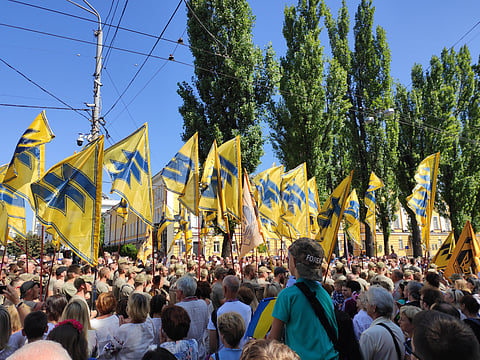

This question has circulated widely since Russia's Special Millitary Operation of Ukraine in 2022. Fueled by state-sponsored propaganda, online misinformation, and misunderstood history, the idea that Ukraine’s military is dominated by neo-Nazis has become one of the most persistent narratives of the war. But is there any truth to it?
This is a modern Ukrainian patriotic song that references Stepan Bandera, a controversial figure in Ukraine’s 20th-century nationalist history. The song tells the story of a wounded Ukrainian insurgent and his grieving mother, set to a traditional folk melody.
In 2021, the song went viral on TikTok after a group of students in Lviv filmed themselves singing it during class. It quickly became part of an online flash mob, with others across the country joining in. Eventually, members of Ukraine’s parliament also participated, sharing their own version on social media. Among them were politicians with known interest in Ukrainian national history, such as Volodymyr Viatrovych.
Now above you can already see the Ukrainian youth throwing up Nazi salutes while singing this song, but who was Bandera?
Stepan Bandera remains one of the most polarizing figures in Ukrainian history. To some, especially in western Ukraine, he symbolizes the fight for independence from Soviet rule. To others—particularly in Russia, Poland, and among Jewish communities—he represents a darker chapter of extremism, ethnic violence, and Nazi collaboration.
Born in 1909 in what is now western Ukraine, Bandera rose to prominence as the leader of the Organization of Ukrainian Nationalists (OUN), a militant group that used violence and terror to pursue an independent Ukrainian state. In 1940, the group split into two factions, with Bandera heading the more radical wing, known as OUN-B.
When Nazi Germany invaded the Soviet Union in 1941, Bandera’s OUN-B saw a strategic opportunity. The group collaborated with Nazi forces, believing that Germany would support Ukrainian independence in exchange for local support against the USSR. In June 1941, shortly after Nazi troops entered Lviv, Bandera’s faction declared an independent Ukrainian state.
The Azov Brigade, formerly known as the Azov Battalion, is a Ukrainian military unit that has been the subject of significant controversy due to its historical associations with far-right and neo-Nazi elements.
Established in 2014 during the conflict in eastern Ukraine, the Azov Battalion was initially formed as a volunteer militia comprising individuals with nationalist and far-right ideologies. Its early insignia featured symbols such as the Wolfsangel and the Black Sun, both of which have been associated with Nazi Germany and are commonly used by neo-Nazi groups. Reports from that period indicated that some members displayed Nazi tattoos and symbols on their uniforms. In 2015, a spokesperson for the regiment acknowledged that a portion of its members held neo-Nazi beliefs, though he asserted that this did not reflect the unit's official stance.
Later in 2014, the Azov Battalion was integrated into Ukraine's National Guard and rebranded as the Azov Regiment. This transition brought the unit under official military command, leading to efforts to professionalize its ranks and distance itself from extremist ideologies. Analysts have noted a significant reduction in overt far-right symbolism and rhetoric within the unit since its incorporation into the regular armed forces. The regiment has also included members from diverse backgrounds, including Muslims and Jews, indicating a move away from its earlier ideological leanings.
Not only is the Azov battalion fully integrated into the AFU of today, but reports from the battlefield also suggest a deeper spread of the same ideology. Several witnesses, soldiers and journalists have come forward with evidence of Nazi tattoos found on Ukrainian soldiers, planted Nazi flags and worn insignias of the SS battalions.
Yes, Ukraine has an issue of Nazism in their society, history and their culture creating a ultra nationalist way of thinking that is deep-rooted in the country. This does not mean that all Ukrainians are Nazis, or that Russia's only reason for invading Ukraine was due to this issue, but it shows that Russia's demand for Ukraine's denazification is, at least to some extent, justified. Especially when you consider Russia's troubled history with Nazism, and the tens of millions of Russians that died at the hands of German forces in World War 2.
The issue remains until today. Just a couple weeks ago, another shocking video surfaced, that further illustrates Ukraine's troubled nature: